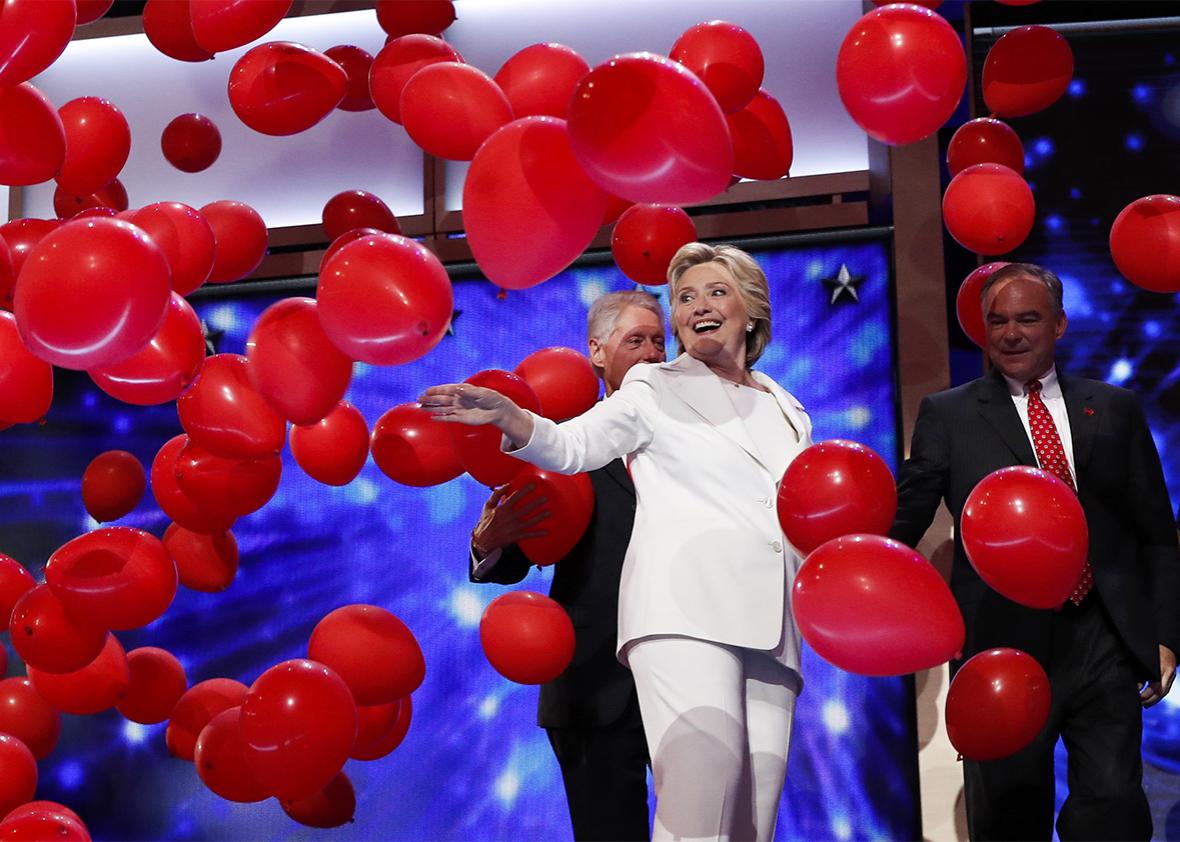Last Wednesday morning, Sen. Tim Kaine was scheduled to hold a campaign event in Alexandria, Virginia, about a 15- or 20-minute drive from downtown Washington. This was the same Tim Kaine who is narrowly favored to win election to the second-highest office in the country in about five weeks. His debate with his Republican counterpart, Indiana Gov. Mike Pence, was just six days away.
I expected the Alexandria event to be mobbed with political reporters, all trying to squeeze in a question about the next mass television spectacle. I did not expect a nothingburger. I did not expect a few congressional reporters and some Virginia local media milling around a rec center for an event that had all the pomp and circumstance of an alderman’s ribbon-cutting ceremony. Former Sen. John Warner, the commonwealth’s longtime Republican legislator, was endorsing the Clinton-Kaine ticket; John Warner’s Senate successor, Sen. Mark Warner (no relation), also came to speak. Also there was the traveling Kaine press pool, members of which—even by the standards of a traveling press pool late in an election season—looked unhappy.
Kaine didn’t hold any reporter gaggle at the event, and there were no opportunities to shout questions in his general direction. Maybe the rest of the media was wise to stay away. But the near-total lack of interest in Kaine’s event ahead of his star turn at Tuesday’s debate in Farmville, Virginia, reflected another strange dynamic in an election season that has no shortage of strange dynamics: the near-total lack of interest in Kaine at all.
By the post-Palin standards of running mate selection—i.e., since the “Do No Harm” admonition became “No, Goddammit, I Mean It. Do. No. Harm!”—Kaine is thus a successful pick. He is qualified. He doesn’t screw up. He may help on the margins with college-educated suburban white voters, the demographic Clinton most needs to offset her losses among noncollege whites, since Tim Kaine is exactly them. Maybe he ices Virginia for the ticket; maybe Virginia was already iced.
But beyond Virginia, all the positive attributes you bring to the ticket don’t matter if voters never see them, or you, for that matter. Have voters seen Tim Kaine?
Behold, the anti-Clinton: Unseen, unknown, Kaine arouses no strong feelings in either direction. He is the Steve Miller Band. He is NPR discussing tennis. He is the sensation produced by the drumming of one’s fingers on one’s desk. The HuffPollster average rates his national approval rating as relatively poor at 29.9 percent favorable to 30.3 percent unfavorable, the numerical equivalent of meh. Pence, by contrast, is viewed positively by 36.4 percent and unfavorably by 30.9 percent. What’s more interesting than the net rating, though, is the difference in undecideds. Thirty-three percent of voters don’t have an opinion of Pence, while 42 percent of voters don’t have one of Kaine. He’s just not as visible.
We can understand why. The stakes are much higher for Pence, who exists now to reassure the religious right that God has a supporting presence on the ticket. His would-be boss is unqualified for the presidency, so Pence will necessarily be a stronger vice president. That means greater scrutiny and attention. There’s also more interest in Pence because, well, when are vice presidential candidates most in demand from media bookers? When their respective presidential candidates screw up. In this sense Pence finds himself on cleanup duty far more often, whether it’s over Trump’s insults of the Khans, his temporary non-endorsements of Rep. Paul Ryan or Sen. John McCain, his refusal (until recently) to state that President Obama was born in the United States, or whatever else. Hillary Clinton is generally disliked but doesn’t commit as many acute gaffes. When she does, though—i.e., following the “basket of deplorables” comment—that’s when Kaine is the most visible.
He can be effective in that role. He doesn’t have to be perpetually on guard the way Clinton has during her public career; it’s not going to be a world-historical event if he uses an imprecise adjective or two. He hasn’t been burned enough, and until he does get burned, his lack of a national presence makes him an underutilized asset for the Clinton campaign.
Kaine shares Clinton’s exact brand of nonthreatening, center-left politics, but because he lacks the baked-in national distrust, he is just the ambassador the campaign needs to keep Republican leaners from congealing around Trump. Consider the line he walked in an NPR interview the week after Clinton’s “deplorables” comment. Host Steve Inskeep asked him what he thinks about “people around the country who aren’t David Duke but are in some way anxious about the demographic change in this country? Are they racists? What do you call them?” He gave a history of how changing demographics and social liberalization in Virginia, for example, was met with what he called a “transitional anxiety”—reasonable fears of the unknown—but then people get over it. And like a proper centrist, he pointed out that immigration to Virginia (“One out of 9 Virginians was born in another country”) has been an economic boon: “We went from bottom 15 per capita income to top 10. By being exclusive and keeping people out, we were hurting ourselves.” Moderate suburban voters love hearing about how changing demographics make everyone rich, whether that’s the full story or not.
The gains that Pence has made for his ticket are more fully realized. He was the movement conservative plucked to bring movement conservatives in line. That blunt message either got across, or it didn’t. Either it has made conservatives feel comfortable casting their vote for an unqualified vulgarian who nevertheless will have some Supreme Court picks in his pocket, or it hasn’t.
Kaine’s is a subtler message, and subtler messages don’t get covered as much. He is Clinton politics without the Clinton baggage. Unless he screws up on Tuesday, the debate is the Clinton-Kaine campaign’s sole opportunity to draw attention to its undercard before he disappears again.
